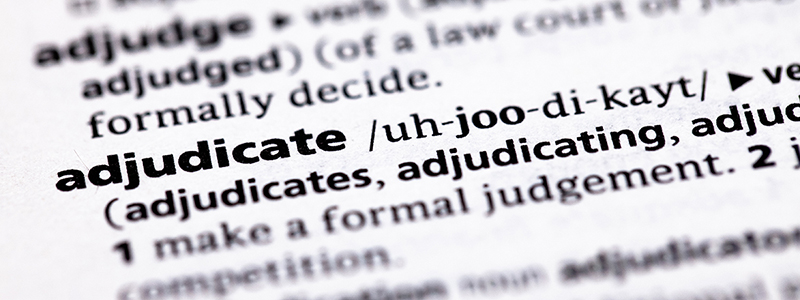How much does Construction Adjudication Cost?
Recoverable costs in adjudication have been something of a taboo subject with some including the judiciary it seems bent on excluding them from the process. You may recall that last year I wrote an article on getting legal costs paid for adjudication proceedings when the Late Payment of Commercial Debts (Interest) Act 1998, updated with 2013 Regulations, was expressly included or implied into the contract. The Act allows any commercial contracting payee (the party owed the money) the right to simple interest of 8% over the base rate and its reasonable costs of recovery incurred pursuing the law breaking erstwhile payer. Justice at last after years without cost recovery for the suffering payee had arrived. Arbicon spent a year exacting justice and claiming costs in adjudication, which worked very well indeed. For the first time that I can remember in nearly 30 years in practice, legal proceedings became commercially practical and useable to payee Clients.
Now you will see that late last year, causing controversy, a TCC case has crept into the enforcement case law domain called Enviroflow Management Ltd v Redhill Works (Nottingham) Ltd TCC [2017] handed down by Justice O'Farrell. In a nutshell the ruling is that Section 108A, of the Construction Act takes precedence over the Late Payment Act, taking away the right of the payee to recover costs in adjudication for the breach of non-payment.
Section 108A of the Construction Act makes a contractual provision made between the parties as to cost in adjudication illegal. The objective of the statute was to eradicate the imbalance of power between the payer and payee in what were known as "Tolent" clauses, which made the named or Referring Party, normally the payee, pay all the proceedings legal costs, of all the parties and the adjudicators fees and expenses, making adjudication impossible commercially and not viable. Section 108A was not designed to allow damages for breach of contract for non-payment to be negated, which is what Enviroflow does. Especially when every other industry and commercial contract in existence has the benefit of the default provisions of the Late Payment Act to protect its payees, the result is payees in construction contracts are now penalised if they need to adjudicate for their money as is commonly the case. That cannot be correct.
In an earlier TCC enforcement case, which should have settled the matter, in which Arbicon were involved, Lulu Construction Ltd v Mullaley & Co. Ltd TCC [2016], which the writer personally witnessed the case in the Courtroom; each party argued the case for costs to be recovered in adjudication. The Adjudicator ordered payment against Mullaley, part of the order was for Late Payment costs and interest due pursuant to the Late Payment Act. Mullaley settled the award save the Late Payment Costs incurred, which were suffered in the adjudication (our fees and other costs), which led to the enforcement action. The Claimant, argued the Late Payment Act applied and guess what? The Defendant argued that Section 108A of the Construction Act prohibited the recovery of costs. None of the eloquent arguments tendered by each side were recorded in the transcript, for reasons unknown to me, the transcript also took weeks to be published and although the matter was enforced and as you will see from other references and articles the judgement was short and vague referring only to the matter of costs as being "connected and ancillary" to the decided dispute. Had the parties' arguments appeared in the transcript, as I said for reasons unknown, the case would have had a completely different form as it would be very clear that the Late Payment Act is supreme over Section 108A of the Construction Act and the decision in Enviroflow that Adjudicator's are now following might well have been the opposite, indeed reinforcing the right to recover costs where the Late Payment Act applies.
So where are we at now with the law? Short of legislation being updated to negate the limited arguments in Enviroflow or a successful appeal possibly following a review of cases like Lulu v Mullaley it is unlikely that costs in adjudication will now be recoverable without a post adjudication notice cost agreement being made.
In our view after a year of recovering costs the adjudication process has suffered a setback having become the most successful and used means to recovery of monies due. Cost is the biggest driving force in any commercial debt recovery/ dispute process, why should you carry the cost for prosecuting your claim for justice? You shouldn't.
The first thing that is asked by the Client and scheduled out by us is matters of cost. Clients ask us:
What is in the cost of adjudication?
How much will the adjudication cost?
Who pays the adjudication costs?
Cost is a fundamental part of the risk a commercial party has to consider in any legal process, there is a misconception that the process is short and inexpensive thus no need for cost recovery. Adjudicator's fees and legal representation can be expensive, plus adjudications can last enough time to make it costly depending on size and complexity. Indeed, the smaller dispute will quickly become non-viable commercially where costs cannot be recovered. Arbicon's primary aim is to make the cost benefit a top priority. There is a need for cost recovery as a right particularly where non-payment is a breach of contract, I would press the legislators to consider this particularly as Adjudication is a successful process that needs to be preserved for all sizes of dispute.
On a final thought, where the Late Payment Act is applicable in a contract this will apply to pursuit of the debt outside of adjudication proceedings, that is the dispute can be rehearsed and prosecuted before any adjudication is commenced and those debt recovery costs incurred in doing so should be recoverable. Arbicon will rehearse and prosecute a claim prior to an Adjudication and seek to recover those costs in the Adjudication, so there is at least a partial solution!
So top tip: Either include a late payment provision that makes the Late Payment Act apply and make sure there is no interest clause in the contract and we will be able to prosecute some of the costs. Ask us to do your contract drafting!

